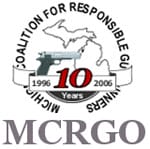Michigan Gun Owner Frequently Asked Questions

Q: Are there places in Michigan where open carry is prohibited?
A: MCL 750.234d states: “…a person shall not possess a firearm on the premises of any of the following:
(a) A depository financial institution or a subsidiary or affiliate of a depository financial institution.
(b) A church or other house of religious worship.
(c) A court.
(d) A theatre.
(e) A sports arena.
(f) A day care center.
(g) A hospital.
(h) An establishment licensed under the Michigan liquor control act…”
The statute does have exceptions. Specifically exempted are:
“(a) A person who owns, or is employed by or contracted by, an entity described in subsection (1) if the possession of that firearm is to provide security services for that entity.
(b) A peace officer.
(c) A person licensed by this state or another state to carry a concealed weapon.
(d) A person who possesses a firearm on the premises of an entity described (above) if that possession is with the permission of the owner or an agent of the owner of that entity.”
So, owners of the places listed can give permission to individuals to possess firearms on the premises. The statute does not require that the permission be in writing. However, one can easily imagine circumstances under which it might be prudent to obtain written permission. Note that the list of exempt persons includes CPL holders. This means that a CPL holder may carry openly in the places listed, since most of them are on the “Pistol Free Zones” (commonly referred to as “Mass-Murderer Empowerment Zones”). Also, the Separation of Powers Doctrine dictates that the Michigan Supreme Court sets policy for the courts and has delegated the decision regarding firearms to the Chief Judge of each Circuit Court. And, of course, the owner or lessee of real property may always decide who, and under what conditions, enters the property. So, if you have reasonable notice that your firearm is not welcome on some piece of private property, you will be considered to be trespassing if you enter the property with your gun.
Q: Is it true that my air rifle is considered a “firearm”?
A: Possibly. MCL 28.421(b) states: ” “Firearm” means a weapon from which a dangerous projectile may be propelled by an explosive, or by gas or air. Firearm does not include a smooth bore rifle or handgun designed and manufactured exclusively for propelling by a spring, or by gas or air, BB’s not exceeding .177 caliber.” So, the answer to your question depends on the caliber of your air rifle and whether the barrel is rifled or not.
Q: Why is the minimum barrel length for shotguns 18 inches and the minimum barrel length for rifles 16 inches?
A: I have been unable to find a definitive answer to this question. The National Firearms Act of 1934 (Title 26, Chapter 53 of the U.S. Code) includes these minimum length requirements. Shorter barrels are not prohibited outright, but must be registered and a transfer tax of $200 must be paid by the new registrant each time the weapon is transferred. The underlying theory is commonly accepted to be that weapons with shorter barrels are more easily concealed, hence the tax and registration requirement. However, I am unaware of the reasoning, if any, that led to the 2-inch difference in the minimum requirements.
As most of the readers of this article are aware, most gun control regulations have little grounding in fact or sound public policy. The history of gun control legislation is a history of poorly-thought-out reaction to tragedies or percieved law enforcement challenges. The late 1920’s and early 1930’s were a period of rapid change in technology and the wide availability of automobiles and modern firearms, including fully-automatic weapons such as the Browning Automatic Rifle and the Thompson submachine gun, combined with jurisdictional fragmentation led to J. Edgar Hoover’s expansion of the FBI and the enactment of the NFA.
Congress being Congress, there were additions to the initial bill, including the requirement that shotguns with barrels of less than 18 inches and rifles with barrels of less than 16 inches be registered and taxed. Since the federal government lacks a “police power” legislate for the general welfare, Congress has to find a textual grant of power in the Constitution that allows it to take any action it takes. The two most common sources of congressional power are the taxing and spending clauses and the commerce clause, which is meant to regulate trade among the states. In the case of the NFA, the taxing power was applied.
It should be noted that Michigan Compiled Law MCL 28.421(e) states: ““Pistol” means a loaded or unloaded firearm that is 30 inches or less in length…” So, any rifle or shotgun less than 30 inches in overall length is considered a pistol under Michigan law.
About:
Steve Dulan (www.StevenWDulan.com) is a member of the Board of Directors of the MCRGO and the MCRGO Foundation, and a member of the Board of Trustees of the MCRGO Foundation. He is an attorney in private practice in East Lansing and Adjunct Professor of firearms law at The Thomas M. Cooley Law School. as well as an NRA Life Member.
About:
The Michigan Coalition for Responsible Gun Owners is a non-profit, non-partisan organization. Formed from just eight people in 1996, we now have thousands of members and numerous affiliated clubs across the state. We’re growing larger and more effective every day.
Our mission statement is: “Promoting safe use and ownership of firearms through education, litigation, and legislation”
